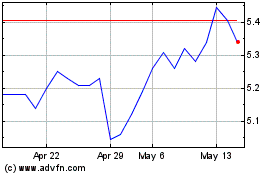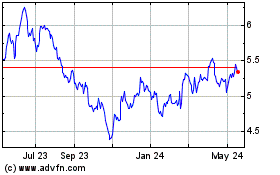By William Boston
BERLIN -- Volkswagen AG's supervisory board is expected to vote
on Friday to replace Chief Executive Matthias Müller with VW brand
chief Herbert Diess, according to people familiar with the
situation, a surprising shake-up after the German auto maker
endured a crisis that cost it billions of dollars.
Mr. Müller, who formerly ran Volkswagen's sports-car marque,
Porsche AG, became CEO in September 2015 in the wake of the
disclosure in the U.S. that the company had rigged millions of
diesel-powered cars to cheat on emissions tests.
The appointment of Mr. Diess, a former BMW AG executive, would
mark an unexpected turn of events for Mr. Müller, who was credited
with steering the world's biggest car maker by sales through the
emissions crisis, accelerating its efforts to develop electric
vehicles and self-driving cars, and returning it to robust profits.
His contract at Volkswagen, which is listed but partially
state-owned, isn't due to expire until 2020.
Mr. Diess, who is 59 years old, has been running the Volkswagen
brand, the company's biggest business by sales, since 2015, having
been hired shortly before the diesel scandal was disclosed. Passed
over for the chief executive job at BMW, he was recruited by
Ferdinand Piech, a former Vokswagen CEO and grandson of Beetle
inventor Ferdinand Porsche.
At any other company, Mr. Müller would likely be celebrated for
boosting the company's share price by more than half since his
appointment. The stock closed at EUR164.26 in Frankfurt on
Monday.
But Volkswagen isn't just any other company, controlled as it is
by a trio of core stakeholders. The heirs to Ferdinand Porsche and
the German state of Lower Saxony together hold more than 70% of the
company's voting stock, while the IG Metall trade union has 10
seats on its board of directors.
Management's ability to create change and adapt the company is
limited, given the vested interests of the Porsche clan to retain
control over the company, even at the expense of profits, and the
shared interests of Lower Saxony and IG Metall to protect the
nearly 250,000 jobs that Volkswagen provides in Germany, nearly
half its global workforce of more than 642,000 employees.
Other German industrial groups such as rival auto maker Daimler
AG and electrical engineering giant Siemens AG have begun to
streamline their businesses and abandon long-held conglomerate
structures. They are breaking out individual businesses in order to
give them more autonomy, making them more flexible and potentially
make them more attractive for investors.
Volkswagen, by contrast, remains sluggish and difficult to
manage because its controlling stakeholders reject more sweeping
management and structural change, said Ingo Speich, a fund manager
at Union Investment, one of Germany largest investment funds.
"Volkswagen needs more flexible structures, but the family is
just interested in maintaining the status quo," said Mr.
Speich.
When Mr. Müller was chosen to lead the company out of the diesel
crisis, the board of directors chose the ultimate insider. At the
time he was CEO of Porsche, but had already spent his entire career
at Volkswagen and its subsidiaries, beginning as an intern at Audi
AG.
As part of Volkswagen's recovery, Mr. Müller pushed a radical
move into electric cars. The strategy was opposed by many
long-serving Volkswagen executives and engineers, but appeared to
have the backing of the board of directors.
Over the past few months, however, Mr. Müller appears to have
lost the trust of the controlling Porsche and Piech families,
according to the people familiar with the situation.
In an interview with The Wall Street Journal last year, Mr.
Müller spoke openly about selling the Ducati motorcycle brand,
owned by Audi, angering the Piech and Porsche families, according
to one of the people.
Mr. Müller also said about EUR20 billion ($24.6 billion) of
Volkswagen's EUR231 billion in annual revenue came from businesses
it no longer considered essential and which were up for disposal,
upsetting the families and representatives of the IG Metall trade
union.
Mr. Müller is known for his strong opinions and candid speech,
which has irritated some members of the controlling families. Last
year, for example, Mr. Müller broke ranks with the rest of the
German auto industry and called on the government to end tax
subsidies for diesel cars and shift that money into supporting
development of electric vehicles, again angering the Porsche and
Piech clans.
"Let's put it this way, you could say that sparks flew," said
one of the people close to the families.
Mr. Müller, who turns 65 this year, has also grown increasingly
frustrated with the slow progress of change at the company and
being forced to play Whac-A-Mole as each new scandal pops up,
according to the people.
One of the people said Mr. Müller was deeply frustrated when it
emerged earlier this year that Volkswagen had been party to
research that involved putting test monkeys in a chamber and
forcing them to inhale diesel fumes.
People familiar with the situation said Mr. Müller's departure
didn't appear to have been triggered by a specific incident or deep
dissatisfaction with his performance. In the end, they said Mr.
Müller and the powers that be at Volkswagen may simply have agreed
it was time for a change.
Earlier Tuesday, Volkswagen said in a short statement it was
considering changes to its senior-management structure, including
possible changes to Mr. Müller's position and responsibilities. The
company said Mr. Müller "showed his general willingness to
contribute to the changes." The German car maker said the review
may not lead to actual changes in management structure or
personnel.
Write to William Boston at william.boston@wsj.com
(END) Dow Jones Newswires
April 10, 2018 13:11 ET (17:11 GMT)
Copyright (c) 2018 Dow Jones & Company, Inc.
Porsche Automobile (PK) (USOTC:POAHY)
Historical Stock Chart
From Jun 2024 to Jul 2024

Porsche Automobile (PK) (USOTC:POAHY)
Historical Stock Chart
From Jul 2023 to Jul 2024
